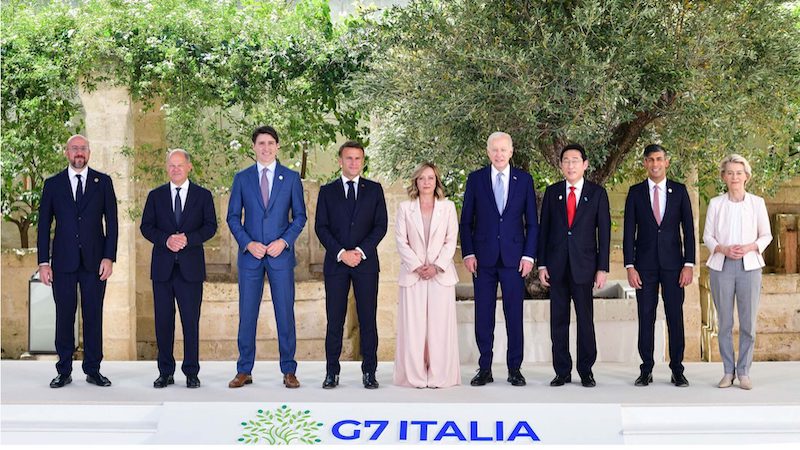In recent years, a less conspicuous shift in the global arena has been the United States’ utilization of the G7 as a strategic tool in the transatlantic system. The reduction of the G8 to the G7 in March 2014, a consequence of developments in Ukraine, indicated no forthcoming peace dividend in the post-Cold War era. Initially formed to navigate global economy affairs, the G7 has evolved into a medium for preserving U.S. world dominance. Marginalizing Russia and recently China as well has become its recurring theme.
In the wake of the West’s unsuccessful attempt to isolate Russia, the G7’s sense of purpose has started to waver. This year, Italy, which is currently hosting the G7 summit, has put a focus on artificial intelligence. Italian Prime Minister Giorgia Meloni received an unexpected guest, the Pope, who made an unprecedented appearance at the G7 event hosted at the lavish Borgo Enyatia hotel. He advocated for the regulation of artificial intelligence, a technology he believes has potential risks. Pope Francis, having been a chemist before his religious calling, will draw upon his scientific background to guide his positions. Giorgia Meloni’s administration has put increasing scrutiny on AI technology, culminating in the temporary ban on ChatGPT in March 2023, a first amongst western countries.
Simultaneously, the G7 is attempting to evolve past its image as an exclusive club of Western democracies. It has invited leaders from non-Western nations to the summit in an expansionary outreach. Along with Ukraine, Meloni has invited leaders from India, Brazil, South Africa, Turkey, Saudi Arabia, Argentina, Algeria, Kenya, and Mauritania. The underlying reasoning behind this selection remains unclear.
However, this is a strategy rooted in pragmatism. The G7 anticipates bridging the gap between the ‘West and the Rest’ in light of the Ukraine crisis. Such invited guests will witness firsthand the culmination of a geopolitical drama revolving around the fraught decision to utilize frozen Russian assets for Ukraine’s military needs.
Recalling events, Western sanctions against Russia in 2022 led to the freezing of Moscow’s assets in Western banks, amounting to an estimated $300-$400 billion. Only a fraction ($5-6 billion) is held in the U.S., whereas the majority ($210 billion) is held in Europe. Despite this, Washington took the lead in proposing the use of these frozen assets to compensate for the war’s consequences, bearing hidden intentions to insulate itself from the costs.
Predictably, there has been opposition from European members and Japan to the U.S. initiative. Yet, it remains a possibility that these nations will eventually accede. The appropriation of Russian funds held in Western banks is undoubtedly controversial; using these funds to support Ukraine could arguably be construed as an act of plundering.
If relations between Russia and Europe continue to deteriorate, the U.S. stands to benefit at Europe’s expense. Adopting such a measure will undermine global financial stability and violate international law, damaging the credibility of European institutions.
It would be noteworthy to observe how G7 leaders justify their actions to the invited countries, many of which are part of BRICS. They must assure these nations that such a practice will not be enforced upon them in the future.
Meanwhile, the impending 16th summit of BRICS, chaired by Russian President Vladimir Putin, looms large for the G7. G7’s attempts to preserve its relevance are challenged by the burgeoning influence of the BRICS nations, which are considering the creation of a unified currency to bolster their economic relationships amidst mounting Western pressure.
Lastly, the G7 faces turbulent times as far-right movements start to gain traction in Europe. Politico reports that distractions due to domestic crises and election campaigns are undermining the effectiveness of the current G7 summit. The fear that a potential victory for Trump in the forthcoming U.S. election might result in a less tolerant attitude towards the G7 adds to the apprehension. Consequently, Meloni seized the initiative to shape an agenda that adheres to Italy’s strategic interests, notably Africa, migration, and Mediterranean affairs.
